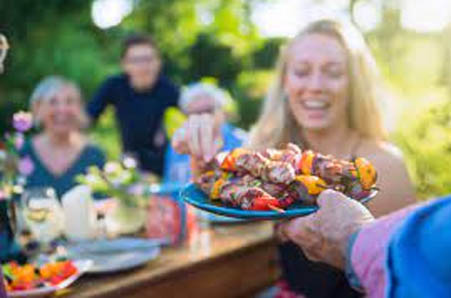Food poisoning is a common concern during the summer months when warmer temperatures can facilitate the rapid growth of bacteria in food. Learn how to prevent and treat food poisoning with these essential guidelines:
Understanding Food Poisoning
Causes of Food Poisoning
Food poisoning occurs due to consuming contaminated food or beverages containing harmful bacteria, viruses, parasites, or toxins. Common causes include improper food handling, inadequate cooking, and cross-contamination.
Symptoms of Food Poisoning
- Nausea
- Vomiting
- Diarrhea
- Abdominal pain and cramps
- Fever
- Weakness and fatigue
Prevention Tips
Food Handling Practices
- Cleanliness: Wash hands, utensils, and surfaces thoroughly before and after handling food.
- Separation: Keep raw meats separate from ready-to-eat foods to prevent cross-contamination.
- Cooking Temperatures: Cook foods to the appropriate internal temperatures to kill harmful bacteria (e.g., poultry to 165°F/74°C).
- Storage: Refrigerate perishable foods promptly and properly store leftovers to prevent bacterial growth.
Safe Outdoor Cooking
- Grilling Safety: Use separate utensils and plates for raw and cooked meats. Ensure meats are cooked evenly and thoroughly.
- Picnic Precautions: Keep cold foods chilled with ice packs and hot foods insulated to maintain safe temperatures.
Water and Beverages
- Safe Drinking Water: Drink bottled water or boiled and filtered water when unsure of the water quality.
- Ice Safety: Use ice from safe water sources or commercially packaged ice.
Treatment Strategies
Hydration
- Fluid Intake: Drink plenty of clear fluids such as water, broth, or electrolyte drinks to prevent dehydration caused by diarrhea and vomiting.
Dietary Adjustments
- BRAT Diet: Initially consume bland, easily digestible foods like bananas, rice, applesauce, and toast to soothe the stomach.
- Avoid Certain Foods: Avoid spicy, fatty, or dairy-rich foods until symptoms subside.
Medication
- Antidiarrheal Medication: Over-the-counter medications like loperamide can help relieve diarrhea symptoms, but consult a doctor if symptoms persist or worsen.
When to Seek Medical Help
Severe Symptoms
- High Fever: Temperature above 101.5°F (38.6°C).
- Persistent Vomiting: Inability to keep liquids down.
- Bloody Stools: Indicates potential bacterial infection or more severe condition.
- Signs of Dehydration: Decreased urine output, dry mouth, dizziness, or lightheadedness.
Summary Table
| Prevention Measure | Description |
|---|---|
| Cleanliness | Proper handwashing and sanitizing surfaces to prevent contamination. |
| Food Separation | Keep raw meats separate from ready-to-eat foods to avoid cross-contamination. |
| Cooking Temperatures | Cook foods thoroughly to kill harmful bacteria and ensure safe consumption. |
| Storage | Refrigerate perishable foods promptly and store leftovers safely. |
| Grilling Safety | Use separate utensils for raw and cooked meats, ensuring thorough cooking. |
| Picnic Precautions | Keep cold foods chilled and hot foods insulated during outdoor gatherings. |
| Safe Drinking Water | Choose bottled or properly treated water to avoid waterborne illnesses. |
| Ice Safety | Use ice from safe sources to prevent contamination in beverages. |
FAQ
How long does food poisoning last?
The duration of food poisoning depends on the cause and severity of symptoms. Mild cases typically resolve within a few days, while severe cases may require medical intervention.
What are the most common causes of food poisoning in summer?
Common causes include improper food handling at picnics or barbecues, inadequate cooking temperatures, cross-contamination, and consuming perishable foods that have not been properly refrigerated.
Can food poisoning be prevented entirely?
While it’s challenging to prevent food poisoning entirely, following safe food handling practices, cooking foods to appropriate temperatures, and ensuring proper storage can significantly reduce the risk.
Should I see a doctor if I suspect food poisoning?
Seek medical attention if you experience severe symptoms such as high fever, bloody stools, or signs of dehydration. Prompt treatment can prevent complications and aid recovery.
Is it safe to take antidiarrheal medication for food poisoning?
Antidiarrheal medications can provide relief from symptoms, but they should be used cautiously and under medical guidance, especially if symptoms are severe or prolonged.

